WITH the small audience watching on at the Sun Studio in Memphis, my left hand grips the large Shure microphone which dates from 1954 when Elvis Presley turned up there to cut his first single, ‘That’s All Right’, and soared into music legend.
Inspired by the iconic photograph of ‘The King’ in full voice on the wall behind me in that very room during those long-past days, I burst into the opening lines of the chorus: ‘Well, that’s alright, mama. That’s all right for you. That’s all right, mama, just anyway you do….’
The crowd – a couple of dozen elderly American music fans on a visit to the historic studio – begin to giggle, nervously, and then to shuffle, urgently, toward the nearby Exit door, confirming that the Elvis magic dust would not be landing on me or my vocal output any time soon.
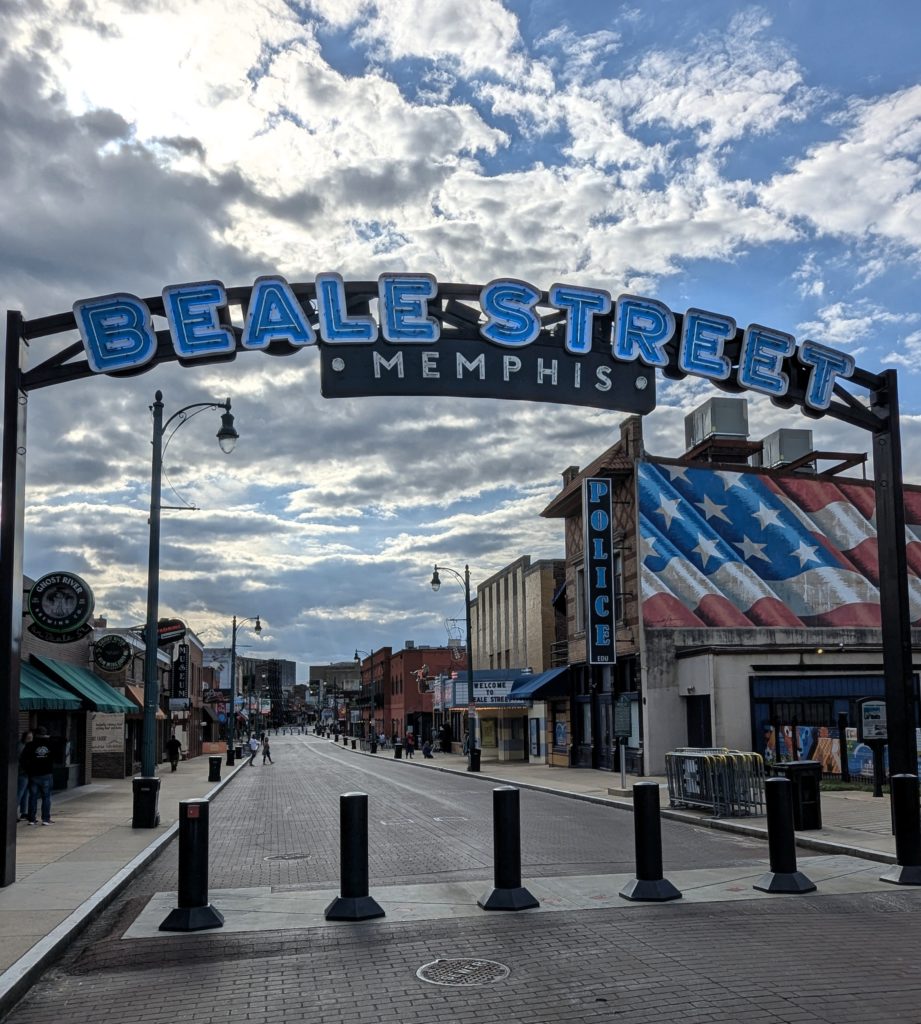 Early evening on Beale Street, Memphis, where blues began (Pics: James Ruddy)
Early evening on Beale Street, Memphis, where blues began (Pics: James Ruddy)Such memorable moments were a regular feature of my 10-day-1000-mile road trip through America’s Deep South in which I explored the music, food and civil rights history but, most of all, discovering if the region’s reputation for hospitality and friendliness has survived the arrival of Trumpian abrasiveness to this great nation.
So, let’s go back a few days to my starting point, which had to be ‘Music City’, Nashville, which has a new direct Aer Lingus flight, four times weekly, from Dublin, with connecting flights from several UK airports (I started out on the early morning hop-over from Birmingham).
On day one, on an early morning stroll through the already-buzzing streets, I can’t fail to notice the many advertising signs - including one 50-foot high downtown mural – that repeat that familiar phrase, ‘The Irish Exit’, denoting someone’s swift and no-fuss departure from a party or a bar, all aimed by Aer Lingus at encouraging locals to take the nine-hour flight from Nashville International to Dublin – just a few highway exits away.
If you are thinking of heading the other way, you will find ‘Nash-Vegas’ a mesmerizing mix of music, absorbing museums (my favourites are the fascinating National African American Music centre and the former home of Country’s Grand Ole Opry, the Ryman Auditorium, where shamed President Nixon once played the piano) and oodles of the best of Southern food.
My quest for classic meals here sees me at the genteel Farm House restaurant tucking into its signature 12-ounce Bone in Porkchop and at Martin’s rocking Bar-B-Que Joint for its quintessential whole hog pulled pork barbecue sandwich. Or how about the gigantic half-pound currant cookie which I battle through whilst downing mugs of Cuban coffee in a tiny joint off Broadway?
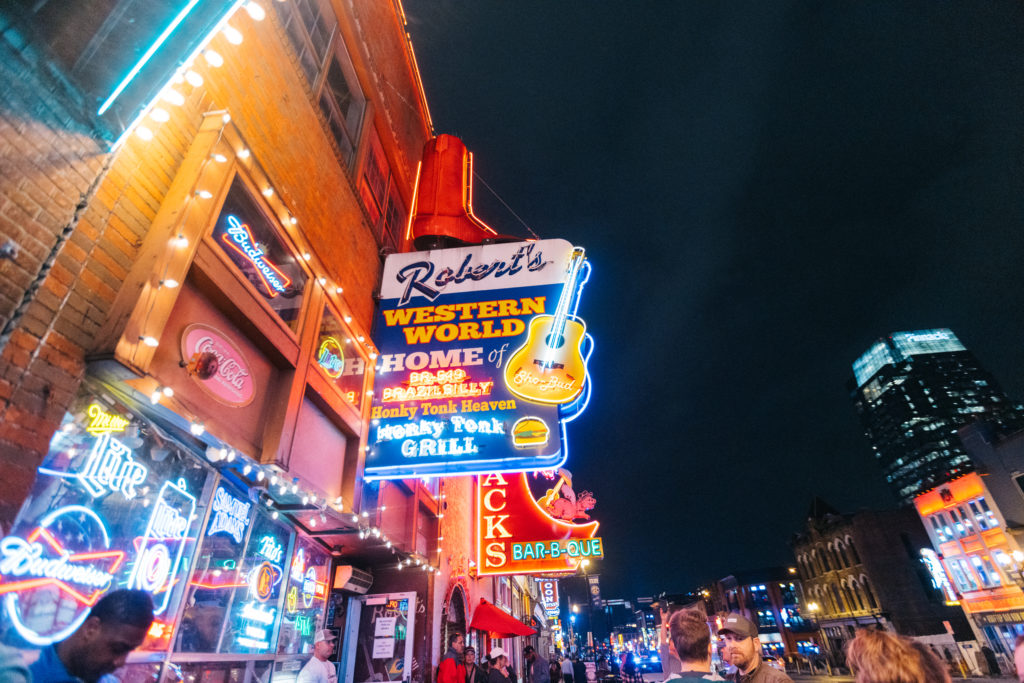 One of Nashville's popular honky tonks on Broadway. (Pic: Nashville Conventiion and Visitors Corp)
One of Nashville's popular honky tonks on Broadway. (Pic: Nashville Conventiion and Visitors Corp)Indeed, at the heart of the walkable downtown, even on a Sunday morning Broadway’s dozens of honky-tonk bars - packed with Stetson-wearing, whooping and line-dancing tourists enjoying classy, all-day country bands – are magnets for fans of their celebrity owners, from Alan Jackson and Jason Aldean to Miranda Lambert and Lainey Wilson. As they say here, it’s livelier than a rattlesnake chewing a power cable!
But, for some welcome tranquillity I walk across the rebuilt Shelby Street Bridge, which crosses the wide Cumberland river and provides great views from one of the longest pedestrian-only bridges in the world. Below me are the cranes that are helping create the new 70,000-seat Tennessee Titans stadium which, at an outlay of $2.1 billion in tourism dollars, will have the roof required to stage the Superbowl and huge concerts. Dolly Parton up next?
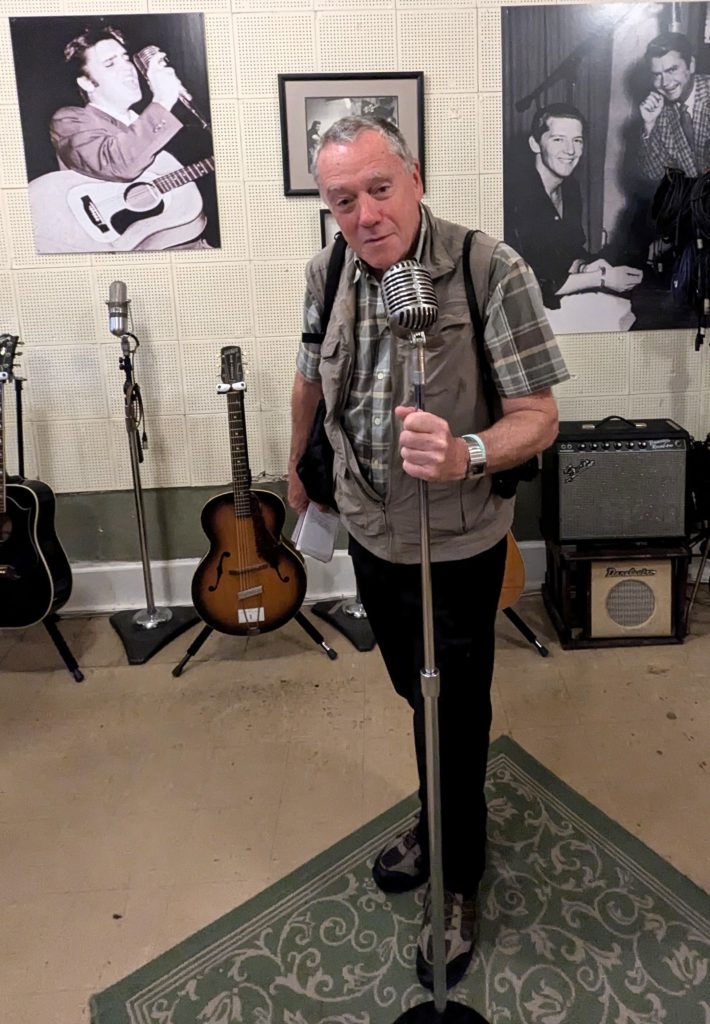 James tries out the Elvis mic at the Memphis Sun Studio
James tries out the Elvis mic at the Memphis Sun StudioTalking of stars, I joined a busload of elderly American ladies on one of the most gossipy trips in town, the ‘Homes of the Stars’ guided tour which allowed us to poke our noses and cameras at the swanky suburban mansions of such Country luminaries as Taylor Swift, Luke Combs, Tammy Wynette and Sheryl Crow.
After three all-action days in ‘Smashville’, I nose my hired Chevvy Equinox a couple of hours southward along Highway 43 across the Tennessee state line into Alabama, where family, food and faith matter most.
First stop is pretty Florence, where I’m soon sat with an entertaining local guide and we’re tucking into a gigantic lunch (they all are in the South) at Champy’s World Famous Fried Chicken place, when an elderly man steps over and introduces himself. He had heard us chatting about the nearby Muscle Shoals and Fame music studios and says he cycled passed the Holiday Inn hotel as a child and waved at four guys in suits and then another group a while later: “That was The Beatles and the Stones,” he says, adding apologetically. “We didn’t know what a big deal they were then. We were just kids.”
After a short drive, I’m at Muscle Shoals, staring at the cramped toilet cubicle in which Keith Richards had locked himself for peace and quiet in 1969 to sit and finish off the ‘Wild Horses’ track for the Rolling Stones multi-million-selling Sticky Fingers album – one of their best and created with the stupendous skills of The Swampers, the studio’s session musicians.
Next day, I’m heading two hours south to Alabama’s former iron and steel boom town, Birmingham (named in 1871 after England’s second city) before dashing into Frothy Monkey for a coffee, and telling the server I’m worried about the coin parking meter outside (it’s $160 if you get towed there). He smiles, bends down and passes me a new $10 roll of quarters in exchange for me giving him a $10 note, saying:” Here, hope these help your blood pressure while you’re in town!”
Of course, you can’t visit Birmingham without dropping by the world’s biggest motorcycle collection at the huge Barber Vintage Motorsports Museum, the creation of dairy magnate George Barber, who has scoured the world for nearly 2000 of them. Almost all are in working order and raced regularly. Countless treasures are on show, from an 1867 steam-powered Roper, to a1938 Lawrence of Arabia Nottingham-built Brough Superior SS100 (remember Peter O’Toole in the film?). There is even a copy of Peter Fonda’s Captain America Harley Davidson Chopper from the 1969 cult classic Easy Rider movie.
Birmingham, however, will forever be burned into the world’s consciousness as the place in 1963 where four Black girls – aged 11 to 14 years - were blown up and killed on a warm and rainy morning by a 15-stick dynamite timebomb planted by Ku Klux Klan members at the 16th Street Baptist Church. The girls were downstairs changing into choir robes for a service before they were murdered and more than 20 others were badly injured.
Next morning I’m driving 90 minutes further south down the relatively quiet interstate to another former flashpoint centre, Alabama’s state capital, Montgomery, which was at the heart of the fight for Black voting rights.
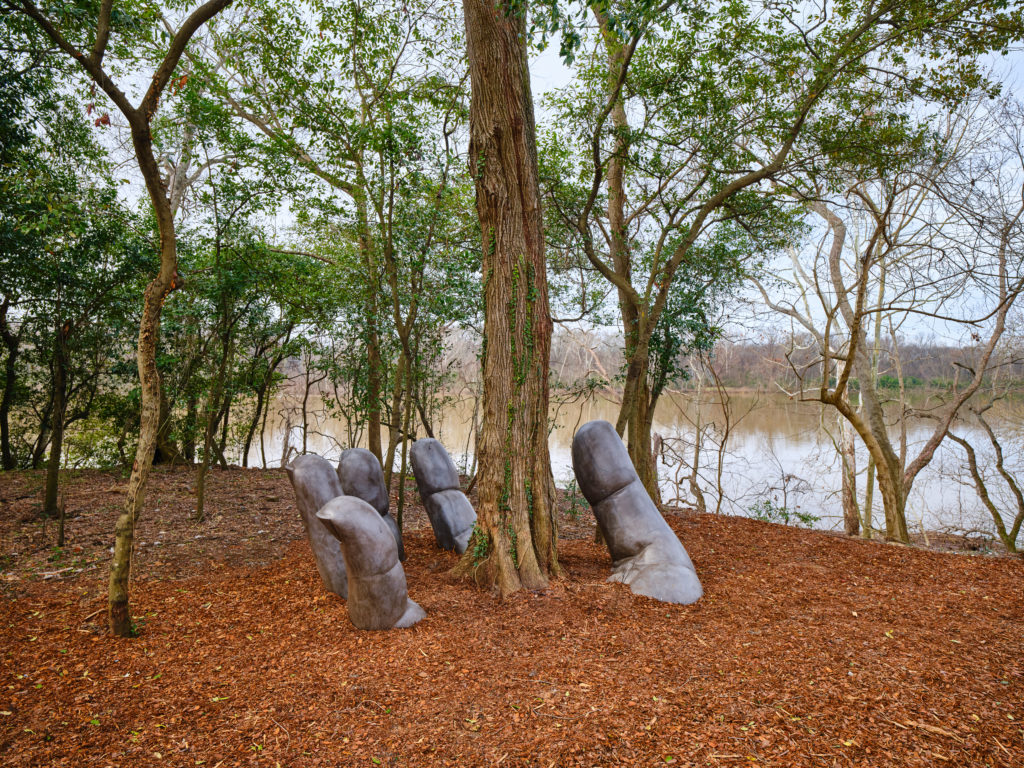 A slave hand sculpture in Montgomery's Freedom Monument Sculpture Park (Pic: Equal Justice Initiative)
A slave hand sculpture in Montgomery's Freedom Monument Sculpture Park (Pic: Equal Justice Initiative)Here I meet the city’s famed storyteller and guide, Valerie Smedley, a retired Black lawyer and lieutenant colonel in the Alabama Army National Guard, who shows me the beautiful Court Square Fountain which was built on an artesian well where thousands of chained slaves - men, women and their children - were bought and sold by wealthy White plantation owners in the 1800s.after being shipped up the Alabama river or in rail trucks to nearby Union Station,
Across the road is the statue of Rosa Parks, the Black activist who refused to give up her bus seat to a White man there in 1955 and helped start an unstoppable juggernaut of change on the road to equality.
Most of her achievements and those of Dr King and others are captured over the next few days, as I view the huge and moving slavery memorial pieces in Montgomery’s Freedom Monument Sculpture Park and take an eerie early morning walk across the mist-shrouded and rusting Edmund Pettus Bridge, at Selma, which was the scene of the ‘Bloody Sunday’ violence by police and White power supporters against peaceful marchers aiming to walk the 50 miles to Montgomery in support of equal voting rights.
Nowadays the South is littered with conscience-jarring museums and memorials to those distant times when Black people couldn’t eat, sleep, ride a bus or even go the same toilet as Whites, let alone vote or be educated.
Some sites, like the Medgar Evers bungalow in Jackson, Mississippi, gives me a shiver of disbelief when I’m shown the bullet hole still in a kitchen wall and the steel bath where the peaceful campaigner’s children sheltered, shaking in fear, on the night he was shot dead outside by a White assassin in 1963.
There are times when I’m left wondering how the profound cruelty of slavery was sanctioned by apparently God-fearing people in Europe and Africa, as well as the USA. And how did the obvious equality that existed in music studios in the 60s and 70s take so long to reach the streets?
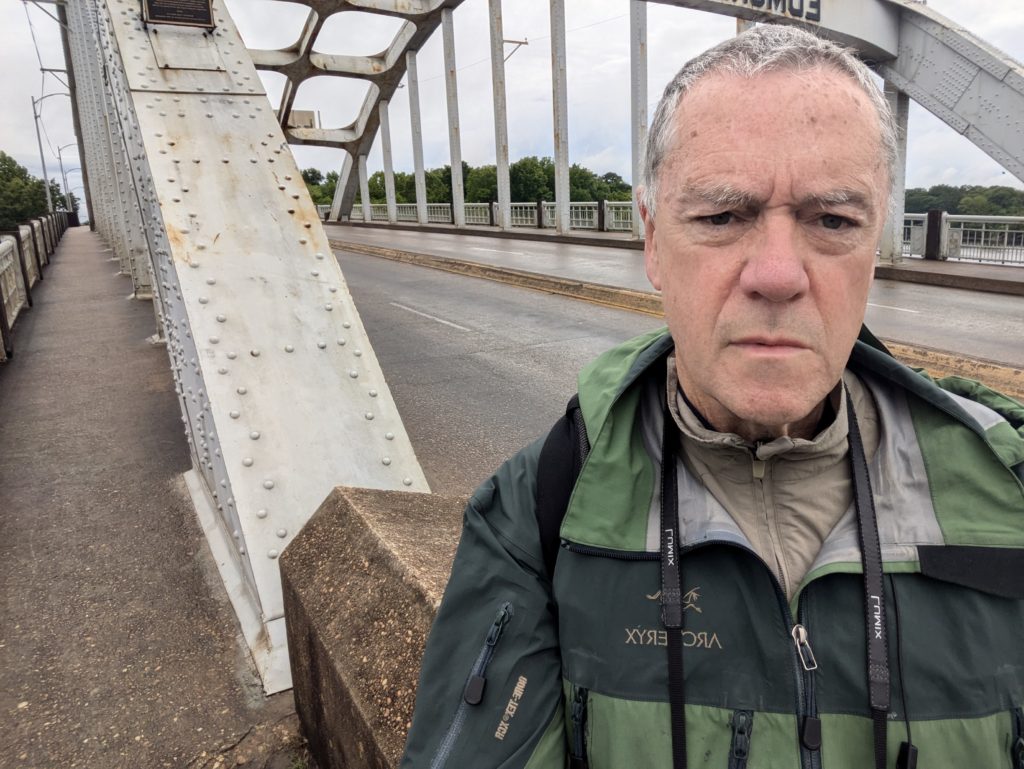 James pictured at the eerie Edmund Pettus Bridge in Selma
James pictured at the eerie Edmund Pettus Bridge in SelmaThat issue aside, I was encouraged by the friendliness I met in so many places on this journey, from the young Black supermarket cashier who joked and laughed disarmingly about my choice of ‘Supersoft’ face soap in a Birmingham supermarket to the elderly White businesswoman who bought me a glass of wine whilst sharing her life story in a downtown bar in Memphis.
But it was, perhaps, in oak-shaded Oxford, the home of the late, great author William Faulkner , where I felt Southern charm at its best as I photographed the pretty 19th century town square early one morning. An elderly White man stopped to inquire about my camera before telling me he was also a photographer and a fine arts printer He then took me to his lovely home, introduced me to his wife and showed me round his studio. Indeed, lunch with them both would have followed if I had had the time.
Similar spontaneous moments happened almost every day, confirming that the warmth of welcome and hospitality to visitors still shines brightly in America’s Deep South, despite those unwelcome clouds hanging over the Trump White House. As they also say here: “Get your motor runnin!”
HOW TO GET THERE:
Flights: Aer Lingus operates four flights per week from Dublin to Nashville. One-way fares start from €299.99 each way including taxes and charges for travel until June 19th. For more information on fares and schedules and to book visit www.aerlingus.com
Packages: This ten-night itinerary is from €2,889pp (£2,437) based on two sharing a room, departing on 9th September 2025 with American Sky. This includes direct return flights with Aer Lingus, fully inclusive car rental, hotel accommodation in three and four star hotels and electronic maps and driving instructions. For American Sky, go to www.americansky.ie or call 01 664 9900,
For a similar seven-night itinerary, the Self-Drive Discover the Deep South Tour is from €1,749pp (£1,475) based on two sharing a room. For further information go to: www.deep-south-usa.com
For individual states, go to: Alabama: www.alabama.travel ; Mississippi: www.visitmississippi.org ; Tennessee: www.TNVacation.com
For cut-price airport parking and hotels, try Holiday Extras: Go to www.holidayextras.com or call 0800 316 5678

